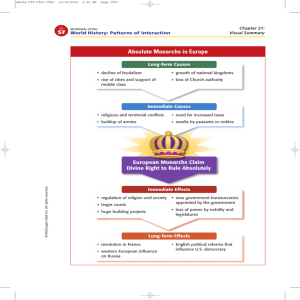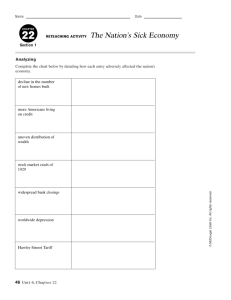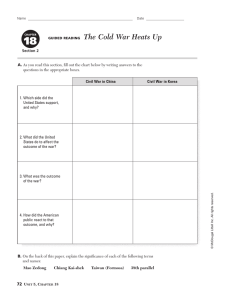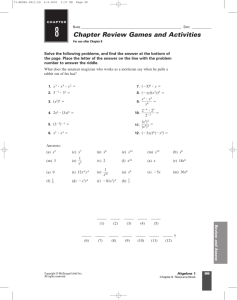hssb1000t vocabprac
advertisement
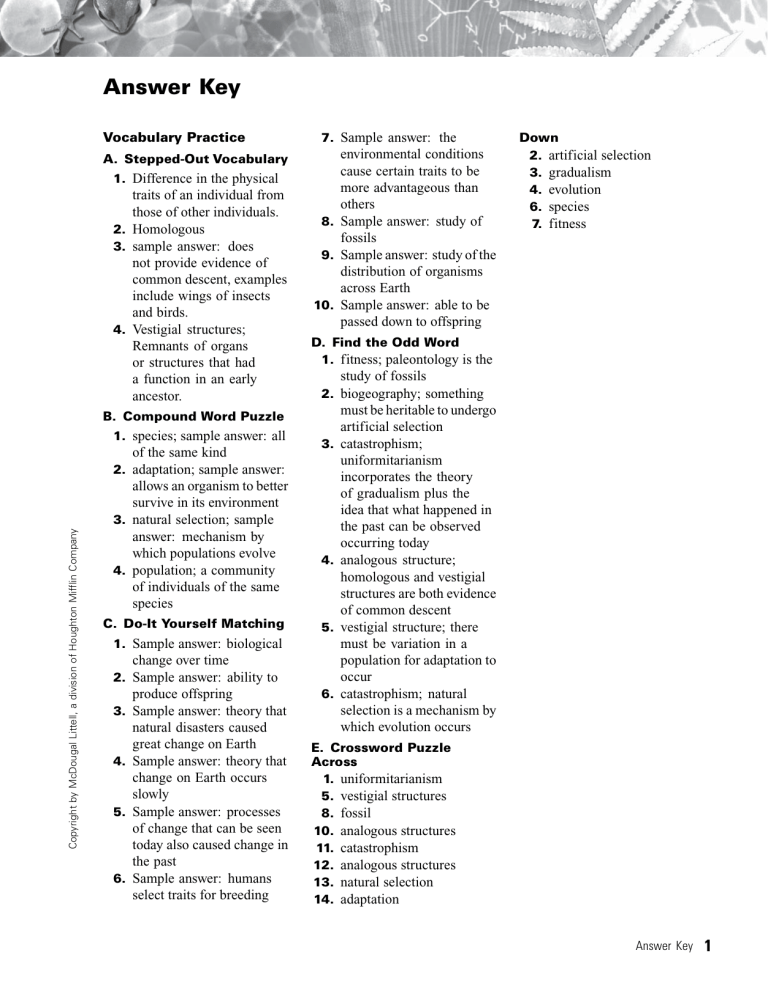
Answer Key Vocabulary Practice A. Stepped-Out Vocabulary 1. Difference in the physical traits of an individual from those of other individuals. 2. Homologous 3. sample answer: does not provide evidence of common descent, examples include wings of insects and birds. 4. Vestigial structures; Remnants of organs or structures that had a function in an early ancestor. 7. Sample answer: the environmental conditions cause certain traits to be more advantageous than others 8. Sample answer: study of fossils 9. Sample answer: study of the distribution of organisms across Earth 10. Sample answer: able to be passed down to offspring D. Find the Odd Word 1. fitness; paleontology is the 2. B. Compound Word Puzzle Copyright by McDougal Littell, a division of Houghton Mifflin Company 1. species; sample answer: all of the same kind 2. adaptation; sample answer: allows an organism to better survive in its environment 3. natural selection; sample answer: mechanism by which populations evolve 4. population; a community of individuals of the same species C. Do-It Yourself Matching 3. 4. 5. 1. Sample answer: biological change over time 2. Sample answer: ability to produce offspring 3. Sample answer: theory that natural disasters caused great change on Earth 4. Sample answer: theory that change on Earth occurs slowly 5. Sample answer: processes of change that can be seen today also caused change in the past 6. Sample answer: humans select traits for breeding Down 2. artificial selection 3. gradualism 4. evolution 6. species 7. fitness 6. study of fossils biogeography; something must be heritable to undergo artificial selection catastrophism; uniformitarianism incorporates the theory of gradualism plus the idea that what happened in the past can be observed occurring today analogous structure; homologous and vestigial structures are both evidence of common descent vestigial structure; there must be variation in a population for adaptation to occur catastrophism; natural selection is a mechanism by which evolution occurs E. Crossword Puzzle Across 1. uniformitarianism 5. vestigial structures 8. fossil 10. analogous structures 11. catastrophism 12. analogous structures 13. natural selection 14. adaptation Answer Key 1 CHAPTER 10 PRINCIPLES OF EVOLUTION Vocabulary Practice variation fitness species adaptation biogeography fossil artificial selection homologous structure catastrophism heritability analogous structure gradualism natural selection vestigial structure uniformitarianism population paleontology CHAPTER 10 Principles of Evolution evolution A. Stepped-Out Vocabulary Determine the vocabulary word that fits best, define each word, or write two additional facts that are related to the word in the spaces below. WORD DEFINITION MORE INFORMATION Example Fossil Traces of an organism that existed in the past. there are different types of fossils Copyright by McDougal Littell, a division of Houghton Mifflin Company they allow scientists to study evolution 1. Variation can occur among members of different species can occur among members of the same species 2. 3. Analogous structures Unit 4 Resource Book McDougal Littell Biology Features that are similar in structure but appear in different organisms and have different functions. evidence of common descent common examples are the forelimbs of vertebrates Structures that perform a similar function but are not similar in origin. Vocabulary Practice 27 CHAPTER 10 Principles of Evolution VOCABULARY PRACTICE, CONTINUED WORD DEFINITION 4. MORE INFORMATION evidence for common descent examples include snake pelvic bones B. Compound Word Puzzle Read the phrase and write the word that it most closely describes. Then write another phrase that describes the same word in a different way. PHRASE 1 WORD PHRASE 2 Example Process of biological change over time Evolution Process by which descendents come to differ from their ancestors 1. Can interbreed and produce fertile offspring 3. The environment is the selective agent 4. All the individuals of a species that live in an area C. Do-It Yourself Matching In a random order, write short definitions for each term on the blank lines to the right. Then give your paper to a classmate who should write the number of the term next to the correct definition. 1.evolution 2.fitness 3.catastrophism 4.gradualism 28 Vocabulary Practice Unit 4 Resource Book McDougal Littell Biology Copyright by McDougal Littell, a division of Houghton Mifflin Company 2. Beneficial feature VOCABULARY PRACTICE, CONTINUED CHAPTER 10 Principles of Evolution 5.uniformitarianism 6.artificial selection 7.natural selection 8.paleontology 9.biogeography 10.heritability D. Find the Odd Word Put a checkmark next to the word that does not belong and explain why. There may be more than one correct way to answer for some of the word sets. 1. fossil Explanation fitness paleontology 2. artificial selection Explanation heritability Copyright by McDougal Littell, a division of Houghton Mifflin Company biogeography 3. catastrophism Explanation gradualism uniformitarianism 4. homologous structure Explanation analogous structure vestigial structure 5. variation Explanation adaptation vestigial structure 6. evolution Explanation natural selection catastrophism Unit 4 Resource Book McDougal Littell Biology Vocabulary Practice 29 CHAPTER 10 Principles of Evolution VOCABULARY PRACTICE, CONTINUED E. Crossword Puzzle Use the clues to solve the puzzle. Across Down 1. Theory that processes that can be seen today also occurred in the past 5. Remnants of organs that functioned in an 8. 10. 11. 12. 13. 14. ancestor Traces or remains of an organism that existed in the past Features with the same function in two organisms but different recent ancestors Theory of dramatic natural events changing Earth Study of fossils Theory of how evolution occurs Beneficial feature that helps survival 1. 2. 3. 4. 6. 7. Choosing particular traits for breeding Theory of slow change over long time periods Process of biological change over generations Members of a group that can interbreed Measure of ability to survive and produce offspring 2. 3. 4. 8. Copyright by McDougal Littell, a division of Houghton Mifflin Company 5. 6. 10. 11. 12. 7. 13. 14. 30 Vocabulary Practice Unit 4 Resource Book McDougal Littell Biology
